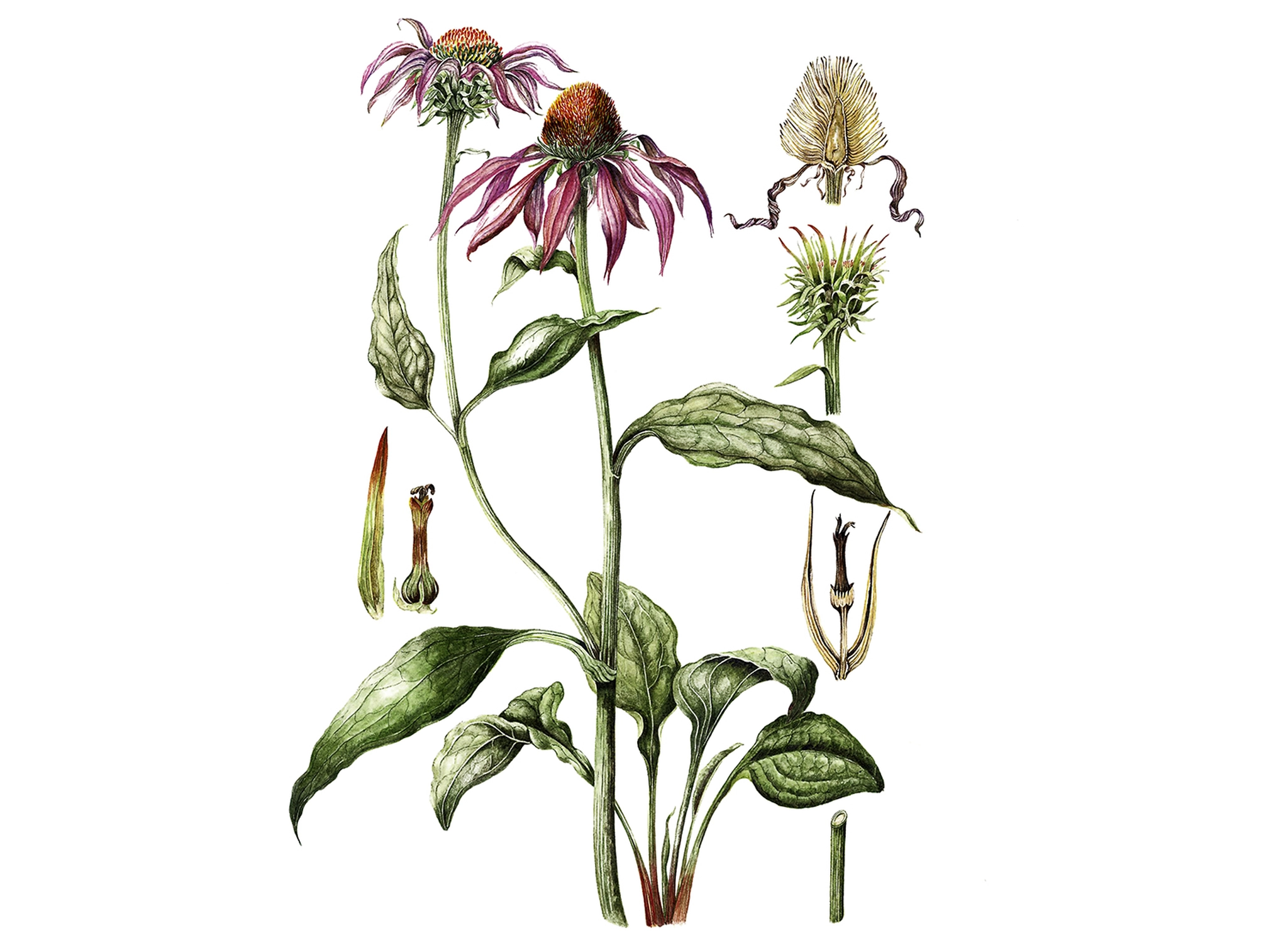
Echinacea angustifolia the processed part of the plant (root, upper parts or whole plant), and the mode of processing has alkamides which are natural products formed by connecting straight-chain, mostly unsaturated, aliphatic acids with various amines. They are a group of bioactive natural compounds showing broad structural variability and an important range of biological activities. Alkamides also represent a class of lipidic compounds structurally related to animal endocannabinoids. Based on the structural similarity of these compounds to anandamide (N-arachidonoylethanolamine), an endogenous cannabinoid cerebral neurotransmitter, alkamides are highly active in the central nervous system. Despite their several biological activities, their immunomodulatory and analgesic properties are most important therapeutic applications. Fatty acid amides (FAAs) are amides formed from a fatty acid and an amine. In nature, many FAAs have ethanolamine as the amine component. Also known as N-acylethanolamines, they contain the functionality RC(O)N(H)CH2CH2OH.
Anandamide is a lipid mediator that acts as an endogenous ligand of CB1 receptors. These receptors are also the primary molecular target responsible for the pharmacological effects of Δ9-tetrahydrocannabinol, the psychoactive ingredient in Cannabis sativa. Anandamide synthesizes in areas of the brain where memory, motivation, superior cognitive processes and movement control are managed. In this way, it influences physiological systems such as pain, appetite regulation, pleasure and reward.
Other Echinacea include Echinacea pallida and Echinacea purpurea have a long history of medicinal use for a variety of conditions, particularly infections, and today echinacea products are among the best-selling herbal preparations in several developed countries. Modern interest in echinacea is focused on its immunomodulatory effects, particularly in the prevention and treatment of upper respiratory tract infections. It has also been used for returning vaginal fungal infections yeast infections along with antifungal products applied to the vaginal area. The chemistry of Echinacea species is well documented, and several groups of constituents, including alkamides and caffeic acid derivatives, are considered important for activity. They are the major lipophilic constituents of ECHINACEA preparations, which are widely used in some European countries and in North America for common colds and flu as well as strengthen the immune system.
Studies on the mechanisms of action of the immunomodulatory activity of Echinacea have indicated that alkamides can act as cannabinomimetics. Endogenous ligands for cannabinoid receptors such as anandamide, an animal alkamide that shares structural similarity with the Echinacea alkylamides, can bind to CB2 cannabinoid receptors. The cannabinoid receptors CB1 and CB2 have been implicated in the modulation of the CNS and the inflammatory response. CB1 receptors are present in neurons from the central and peripheral nervous system and are concentrated in the brain. CB2 receptors are mainly present in immune cells, such as macrophages.
Caffeic acid and some of its derivatives such as caffeic acid phenetyl ester (CAPE) and octyl caffeate are potent antioxidants which present important anti-inflammatory actions. Lipophilicity (from Greek λίπος "fat" and φίλος "friendly"), refers to the ability of a chemical compound to dissolve in fats, oils, lipids, and non-polar solvents such as hexane or toluene.
Macrophages (abbreviated as Mφ, MΦ or MP) (Greek: large eaters, from Greek μακρός (makrós) = large, φαγεῖν (phagein) = to eat) are a type of white blood cell of the immune system that engulfs and digests anything that does not have, on its surface, proteins that are specific to healthy body cells, including cancer cells, microbes, cellular debris, foreign substances, etc. The process is called phagocytosis, which acts to defend the host against infection and injury.
(AnxioCalm) is a safe and effective treatment for mild to moderate Generalized Anxiety Disorder (GAD) symptoms. Patients take 20 mg tablet of Echinacea angustifolia root extract standardized for a specific alkamide profile, two tablets twice daily (total daily dose of 80 mg) for two weeks.

Not a Real "Professor J"